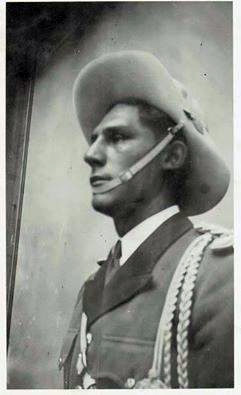On Saturday, June 10, 1939, the New York World’s Fair’s twenty-four member Haskell Guard escorted King George VI and Queen Elizabeth into “The World of Tomorrow.” Known as Grover Whalen’s pride and joy, these expert horsemen, culled from three Indian reservation schools, lent a great sense of dignity to the royal occasion.
Julius Holmes, Whalen’s administrative assistant, early on suggested a mounted Indian guard to usher visiting dignitaries from the entrance gates to Perylon Hall and throughout the fairgrounds. Holmes formerly served as a cavalry lieutenant at the Haskell Institute for Indians in Lawrence, Kansas. He enthralled Whalen with tales of the school student’s equine prowess.
Whalen dispatched his director of Public Safety, former Police Commissioner John J. Sullivan, to select the horsemen for his light cavalry contingent. Sullivan was struck by the quality of the thousand applicants’ horsemanship. He narrowed down the candidates by rather politically incorrect standards: “I was looking for typical American Indian characteristics such as straight black hair, high cheek bones, aquiline noses and bronze complexions. Those chosen were of the darker type or Plains Indians.”
After four elimination tests, Sullivan selected twenty – six riders to travel to New York and serve as Grover Whalen’s personal guard. Twenty – four served on horseback while two tended the stables. They ranged in age from 19 to 23, stood five feet, eleven and one – half inches and weighed approximately 170 pounds. Each spoke the native language of the nineteen tribes they represented, including Creek, Cheyenne, Pawnee, Sioux, and Chippewa.
Upon arriving in New York, the young recruits fell under the command of Captain James W. Lansing, a fellow Kansan who previously oversaw a CCC camp.
The fair rented a two – story brick house on 108th Street for Guard’s barracks. Captain Lansing ran the co – operative kitchen on army standards. The twenty – six horsemen, Lansing and two resident cooks shared the weekly food expenses at $4.00 apiece. As every man gained from eight to twenty pounds and added two inches to his waist in the first month, Lansing ordered a reduction in the quantity of food to maintain the troop’s physical standards.
Twenty – two riders received $30 a week for their services while the four serving as “warriors,” or sergeants, drew paychecks for $36.00. As the twenty – six young Indians were wards of the government, Lansing, in a special agreement with the Indian Bureau of the Department of the Interior, sent half of their pay to their respective Indian agencies to be held in savings accounts for their future education or business interests.

The Haskell Guard generally served a fourteen hour day. The young riders responded to their first call at 6:30 a.m. After breakfast, they groomed their own horses. Although technically a unit of the world’s fair’s police department, their main duty revolved around escorting dignitaries throughout the fair each day. Their sweep and flash always “stopped the show.” Denmark’s Crown Prince Frederik, one of the first dignitaries to experience their royal treatment, told John Sullivan he was amazed by the quality of their horsemanship. The only dignitary not receiving a Haskell escort was Charlie McCarthy. In honor of the diminutive radio and movie star, residents of Morris Gest’s Little Miracle Town (a popular concession in the Entertainment Zone) did the honors.
While the Haskell Indians received universal praise for their horsemanship, an unexpected incident drew their ire. The New York press corps raved over a troop of Canadian Mounties that performed intricate musical maneuvers in the Court of Peace. Not to be outdone, the Indian troupe practiced in a nearby empty lot in Flushing for two days and stole into the Court of Peace late Friday evening, July 7. The next day the Haskell Guard surprised a large crowd of sightseers, duplicating the intricate maneuvers of their Canadian rivals.
On August 25 the fair’s administration reluctantly disbanded the popular Haskell Guards, as the twenty – six participants returned to Kansas for the fall school term. The horses, purchased from Southern breeding farms for an estimated $400 each, were auctioned off at the Ally Pond Stables in mid – September. The once noble striders in The World of Tomorrow were now relegated to ignominious careers – pulling hacks or ice wagons or touring the bridle paths of New York City parks. The red – brown steeds sold for an average price of $120.00.
- Return to:
- Government
- Court of Peace
